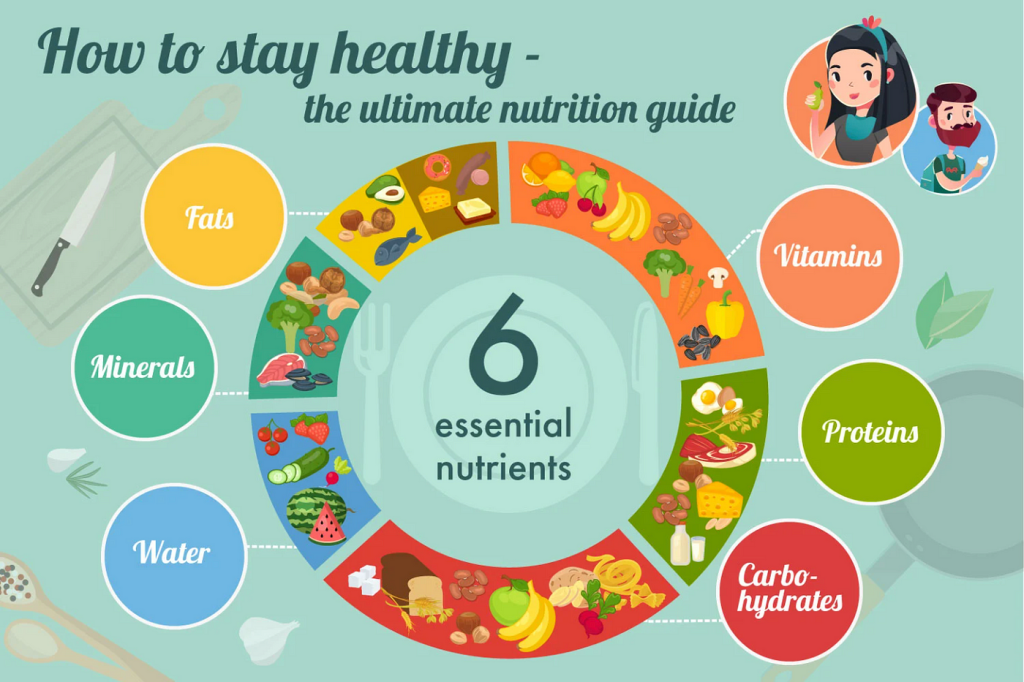Are you confused about what your body really needs to achieve balanced nutrition? Look no further than “The Ultimate Guide to Balanced Nutrition: What Your Body Really Needs.” This comprehensive guide will provide you with invaluable insights into the essential nutrients your body requires for optimal health and well-being. From understanding macronutrients to deciphering food labels, this article has got you covered. So, whether you’re a health enthusiast or simply want to make better choices, this guide will empower you with the knowledge to nourish your body the right way.
Nutrition Basics
Macronutrients and Micronutrients
When it comes to maintaining a healthy and balanced diet, it’s important to understand the role of macronutrients and micronutrients. Macronutrients refer to the nutrients that our bodies need in large amounts for energy and include carbohydrates, proteins, and fats. On the other hand, micronutrients are the essential vitamins and minerals that our bodies require in smaller quantities for various functions, such as supporting our immune system and keeping our bones strong.
Calories and Energy Balance
Calories are the units of energy that our bodies obtain from the food we consume. To maintain a healthy weight, it’s crucial to achieve an energy balance by consuming the right amount of calories that align with our individual needs. Consuming more calories than we burn can lead to weight gain, while consuming fewer calories than needed can result in weight loss. It’s important to strike a balance to ensure we provide our bodies with the energy it requires to function optimally.
The Importance of Water
Water is often overlooked but plays a vital role in maintaining overall health. It is essential for various bodily functions, such as regulating body temperature, transporting nutrients, lubricating joints, and flushing out waste products. Staying hydrated is vital for optimal bodily function, digestion, and mental clarity. It is recommended to drink at least eight glasses of water per day, although individual water needs may vary based on factors such as physical activity and climate.
Understanding Macronutrients
Carbohydrates
Carbohydrates are the body’s primary source of energy and are classified into two main types: simple and complex carbohydrates. Simple carbohydrates, often found in foods like sugar, white bread, and baked goods, are quickly digested and provide a rapid but short-lived burst of energy. On the other hand, complex carbohydrates, found in foods like whole grains, legumes, and vegetables, are digested more slowly, providing a sustained release of energy and promoting feelings of fullness.
Proteins
Proteins are essential for building and repairing tissues, producing enzymes, hormones, and antibodies, and supporting overall growth and development. Complete proteins contain all the essential amino acids our bodies need and are found in animal-based sources such as meat, fish, and dairy products. Incomplete proteins, found in plant-based sources like beans, lentils, and nuts, lack one or more essential amino acids but can be combined to form complete proteins.
Fats
Contrary to popular belief, fats are an important part of a healthy diet. They provide essential fatty acids that our bodies cannot produce on their own and are necessary for hormone production, insulation of organs, and the absorption of fat-soluble vitamins. Saturated fats, found in animal products and some tropical oils, should be consumed in moderation. Unsaturated fats, found in foods like nuts, avocados, and olive oil, are considered healthy fats and can help lower cholesterol levels. Trans fats, often found in processed and fried foods, should be avoided as they can increase the risk of heart disease.

Carbohydrates
Simple Carbohydrates
Simple carbohydrates, also known as simple sugars, are made up of one or two sugar molecules. They are easily and quickly digested, leading to a rapid increase in blood sugar levels. While they can provide a quick burst of energy, they are generally considered less nutritious compared to complex carbohydrates. Simple carbohydrates are often found in foods like candy, soda, fruit juices, and processed baked goods. Consuming these in moderation is recommended to avoid blood sugar spikes and crashes.
Complex Carbohydrates
Complex carbohydrates, also known as polysaccharides, consist of long chains of sugar molecules. Due to their complex structure, they take longer to break down in the body, leading to a slower release of energy. Complex carbohydrates are abundant in foods such as whole grains, fruits, vegetables, and legumes. These foods are rich in fiber, vitamins, and minerals, and provide sustained energy and a feeling of fullness.
Food Sources of Carbohydrates
Carbohydrates can be found in a wide variety of foods, both in their simple and complex forms. Some excellent sources of carbohydrates include whole grains like brown rice and quinoa, fruits like bananas and apples, vegetables like sweet potatoes and broccoli, and legumes like lentils and black beans. Including a variety of these foods in your diet can ensure you get a good balance of macronutrients along with other essential nutrients.
Proteins
Complete Proteins
Complete proteins contain all the essential amino acids that our bodies need to function properly. They are typically found in animal-based foods such as meat, poultry, fish, eggs, and dairy products. These protein sources provide our bodies with all the necessary building blocks for growth, tissue repair, and the production of enzymes and hormones. Consuming a variety of complete proteins ensures that we meet our protein needs and maintain optimal health.
Incomplete Proteins
Unlike complete proteins, incomplete proteins lack one or more essential amino acids. They are often found in plant-based sources such as beans, lentils, grains, and nuts. While they may not provide all the necessary amino acids on their own, combining different incomplete protein sources can create a complete protein. For example, consuming rice and beans together forms a complete protein. Vegetarians and vegans can meet their protein needs by incorporating a variety of plant-based protein sources into their diet.
Food Sources of Proteins
Proteins can be found in both animal-based and plant-based foods. Animal-based sources, such as chicken, beef, fish, eggs, and dairy products, are rich in complete proteins. Plant-based sources, such as beans, lentils, tofu, quinoa, and nuts, are rich in incomplete proteins. Combining different plant-based protein sources throughout the day ensures that you get all the necessary amino acids for your body’s needs.

Fats
Saturated Fats
Saturated fats are primarily found in animal-based sources such as fatty cuts of meat, whole milk, butter, and cheese. They are also present in some plant-based sources like coconut oil and palm oil. Consuming too much saturated fat can raise cholesterol levels and increase the risk of heart disease. It’s important to consume saturated fats in moderation and choose healthier alternatives whenever possible.
Unsaturated Fats
Unsaturated fats, both monounsaturated and polyunsaturated, are considered healthy fats and are essential for our bodies. They can be found in foods such as avocados, nuts, seeds, and olive oil. These fats help reduce bad cholesterol levels, support brain health, and reduce the risk of heart disease. Including unsaturated fats in your diet can contribute to a healthier heart and overall well-being.
Trans Fats
Trans fats are artificially created fats found in processed and fried foods. They are known to increase bad cholesterol levels and raise the risk of heart disease. Avoiding foods high in trans fats, such as fast food, commercially baked goods, and margarine, is crucial for maintaining a healthy diet and reducing the risk of cardiovascular diseases.
Food Sources of Healthy Fats
Including healthy fats in your diet is important for overall health. Excellent sources of healthy fats include avocado, oily fish like salmon and sardines, nuts and seeds, olive oil, and flaxseed oil. These foods provide essential fatty acids and can be incorporated into meals and snacks to support optimal health.
Micronutrients: Vitamins and Minerals
The Role of Vitamins
Vitamins are essential organic compounds that our bodies require in small amounts to carry out various functions. They play a crucial role in maintaining overall health, supporting growth and development, and ensuring proper functioning of bodily processes. There are thirteen essential vitamins, including vitamins A, B, C, D, E, and K, each with its unique benefits and functions. Consuming a balanced and varied diet is crucial to ensure an adequate intake of vitamins.
The Role of Minerals
Minerals are inorganic substances that our bodies require in small amounts to function properly. They play essential roles in maintaining bone health, supporting muscle function, balancing body fluids, and carrying out various enzymatic reactions. Common minerals include calcium, iron, potassium, magnesium, and zinc. Consuming a diverse range of foods can help ensure an adequate intake of minerals.
Food Sources of Vitamins and Minerals
Vitamins and minerals can be found in a variety of foods, both plant-based and animal-based. Fruits and vegetables are excellent sources of vitamins, while minerals can be found in foods such as lean meats, whole grains, nuts, seeds, and dairy products. Including a colorful array of fruits and vegetables in your meals can help provide a wide range of essential vitamins, while incorporating a variety of whole foods will ensure an adequate intake of minerals.

Developing a Balanced Meal Plan
Evaluating Your Caloric Needs
To develop a balanced meal plan, it’s important to start by determining your individual caloric needs. Factors such as age, sex, weight, height, activity level, and goals (weight loss, maintenance, or weight gain) should be taken into consideration. Consulting with a registered dietitian or using online calculators can help you determine an appropriate calorie range to meet your goals while ensuring proper nutrition.
Building a Plate with Proportions
When creating a balanced meal, it’s helpful to follow the “plate method” to ensure a proper distribution of macronutrients. This method involves dividing your plate into sections: half should be filled with non-starchy vegetables, one-quarter with lean proteins, and one-quarter with whole grains or starchy vegetables. Adding a serving of healthy fats, such as avocado or olive oil, can also be incorporated into the meal. This method ensures a good balance of nutrients and portion control.
Portion Control
Portion control is an important aspect of maintaining a healthy diet. Even if you’re consuming nutritious foods, overeating can lead to weight gain and other health issues. Measuring and weighing food portions, using smaller plates, and being mindful of portion sizes can help you maintain a healthy weight and achieve optimal nutrition.
Meal Timing
Meal timing can also play a role in maintaining a balanced diet. It’s important to listen to your body’s hunger and fullness cues and eat meals and snacks at regular intervals throughout the day. Some individuals find it beneficial to eat smaller, more frequent meals, while others prefer three balanced meals with snacks in between. Finding a meal timing routine that works for your body and lifestyle can help you maintain consistent energy levels and avoid excessive hunger or overeating.
Dietary Considerations for Specific Needs
Pregnancy and Breastfeeding
Pregnancy and breastfeeding are critical stages where proper nutrition is crucial for both the mother and the developing baby. During pregnancy, it’s important to consume additional calories and nutrients to support the growth and development of the fetus. A balanced diet rich in fruits, vegetables, whole grains, lean proteins, healthy fats, and prenatal supplements can provide the necessary nutrients. Breastfeeding mothers should continue to eat a well-balanced diet to support milk production and provide optimal nutrition to their babies.
Childhood Nutrition
Providing children with a balanced and nutritious diet is essential for their growth, development, and overall health. Childhood nutrition should include a variety of fruits, vegetables, whole grains, lean proteins, and low-fat dairy products. Limiting the consumption of sugary snacks, sweetened beverages, and processed foods is important to prevent childhood obesity and promote healthy habits.
Adolescent Nutrition
Adolescence is a time of rapid growth and development. Proper nutrition during this stage is crucial for supporting physical growth, promoting brain health, and establishing healthy eating habits. A balanced diet that includes nutrient-dense foods such as fruits, vegetables, lean proteins, whole grains, and healthy fats is important. Encouraging adolescents to make healthy food choices and providing education on proper nutrition can set the stage for a lifetime of good health.
Nutrition for Athletes
Athletes have unique nutritional needs due to the demands of their training and physical activity. Proper nutrition can enhance athletic performance, aid in muscle recovery, and prevent injuries. Athletes should consume adequate carbohydrates for energy, sufficient protein for muscle repair and growth, and healthy fats for overall health. Hydration is also crucial for athletes, and staying properly hydrated before, during, and after exercise is important for optimal performance.
Nutrition for Seniors
As we age, our bodies undergo various changes, including shifts in metabolism and nutrient absorption. It’s important for seniors to maintain a well-balanced diet that accounts for these changes and provides the necessary nutrients to support healthy aging. Ensuring an adequate intake of protein, calcium, vitamin D, and fiber is vital. Seniors should also pay attention to hydration and maintain regular physical activity to support overall health and well-being.
Vegetarian and Vegan Diets
Vegetarian and vegan diets are becoming increasingly popular, with many individuals choosing to abstain from or limit their consumption of animal products. These diets can provide adequate nutrition when properly planned, but it’s important to ensure a variety of plant-based protein sources (such as legumes, tofu, tempeh, and quinoa) to meet protein needs. Including a wide array of fruits, vegetables, whole grains, nuts, and seeds can also provide the necessary vitamins, minerals, and healthy fats found in a balanced diet.

Creating a Balanced Diet in Different Cultural Contexts
Traditional Diets and Their Nutritional Value
Traditional diets often reflect the cultural and environmental factors of a specific region. These diets are typically rich in whole, minimally processed foods that provide a wide range of nutrients. For example, the Mediterranean diet emphasizes fruits, vegetables, whole grains, healthy fats (such as olive oil), and lean proteins (such as fish and legumes). Understanding and appreciating the nutritional value of traditional diets can provide insights into creating a balanced diet that aligns with cultural preferences.
Adapting Traditional Diets to Modern Lifestyles
While traditional diets can provide valuable insights into balanced nutrition, it’s essential to adapt them to modern lifestyles. Factors such as convenience, accessibility, and personal preferences can influence how traditional diets are incorporated into daily life. Finding creative ways to include traditional ingredients and dishes alongside modern convenience foods can help individuals maintain a balanced diet that aligns with both cultural and lifestyle choices.
Maintaining a Healthy Lifestyle
The Importance of Regular Physical Activity
In addition to proper nutrition, regular physical activity is a crucial component of a healthy lifestyle. Engaging in exercise and maintaining an active lifestyle provides a wide range of benefits, including improved cardiovascular health, increased muscle strength and flexibility, enhanced mood, and better weight management. Finding activities that you enjoy and making them a regular part of your routine can significantly contribute to overall well-being.
Managing Stress and Sleep
Stress and sleep are often overlooked aspects of maintaining a healthy lifestyle. Chronic stress can have a negative impact on our physical and mental health, affecting our immune system, digestion, and overall well-being. Adequate sleep is also crucial for our bodies to repair and rejuvenate. Prioritizing stress management techniques such as meditation, deep breathing exercises, and engaging in activities you enjoy can help reduce stress levels. Establishing a consistent sleep routine and aiming for 7-9 hours of quality sleep per night can contribute to overall health and vitality.
Moderating Alcohol Consumption
While moderate alcohol consumption can be a part of a balanced lifestyle for some individuals, excessive alcohol intake can have detrimental effects on our health. Heavy alcohol consumption can lead to liver damage, heart disease, and an increased risk of certain types of cancer. It’s important to be mindful of the amount of alcohol consumed and to adhere to recommended guidelines. If you choose to drink alcohol, it’s important to do so in moderation and prioritize your overall health.
Avoiding Fad Diets
Fad diets often promise quick and dramatic results but are generally not sustainable or healthy in the long term. These diets often restrict certain food groups or encourage extreme calorie restriction, which can lead to nutrient deficiencies, poor energy levels, and a negative relationship with food. Instead of following fad diets, it’s important to focus on making long-term lifestyle changes by adopting a balanced and sustainable approach to nutrition. Emphasizing whole, minimally processed foods and practicing portion control can help you achieve and maintain a healthy weight while providing your body with the key nutrients it needs.


